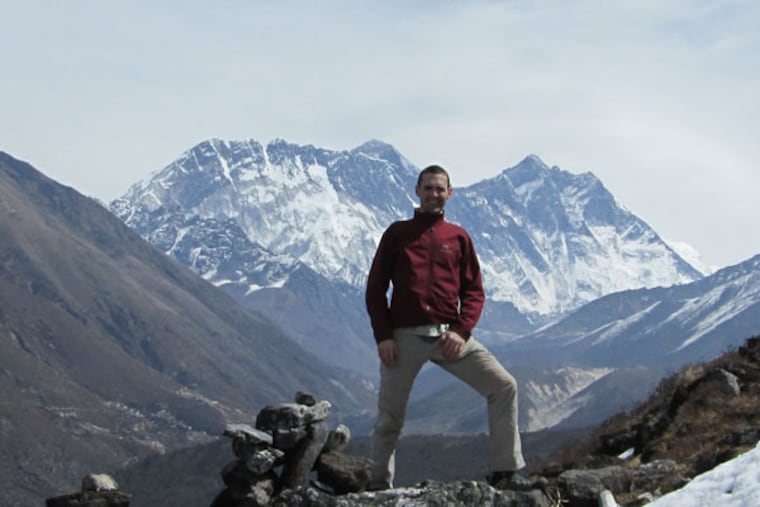Penn law grad and Mt. Everest climber tells of surviving Nepal quake
Andrew Towne, 33, was eating lunch in a tent at base camp on Mount Everest when the ground beneath him began to sway.

Andrew Towne, 33, was eating lunch in a tent at base camp on Mount Everest when the ground beneath him began to sway.
He and others scrambled out of the tent, said Towne, a new graduate of the University of Pennsylvania. That's when "we saw this wall of snow descending to the north."
The avalanche that followed would bury large areas of base camp, killing 19 climbers - just a fraction of the devastation in Nepal, where that magnitude-7.8 earthquake on April 25 and a second one on May 12 left more than 8,000 dead and 20,000 injured and destroyed 489,000 homes.
Towne, an avid mountaineer on a quest to climb what would have been number six of the "Seven Summits" - the highest peaks on each continent - was lucky. He was dusted with just three inches of snow. A hundred yards away, it was a different story: "A third of base camp looked as though a shotgun had shot across the center of it."
Towne and his fellow climbers, with a group called International Mountain Guides, shifted into rescue mode. His camp became the field hospital and triage center, and he and others began assisting the injured.
"The first casualties started to arrive within an hour, injured or dying. Some were able to walk with assistance. Others were being carried in makeshift stretchers," he said.
Towne and others began helping doctors, fetching water bottles and sleeping bags, and applying splints.
Jon Reiter, 50, of Kenwood, Calif., who was at Everest during the deadly 2014 avalanche, was also at base camp with Towne. Whether that makes him lucky or unlucky, he's not sure.
By his count, 58 injured came through the camp. "People were dying in the tents, and [Towne] was this calm force through it all," he said.
Reiter and others helped line up 18 dead climbers for recovery, and he caught a ride with the helicopter that moved the bodies to Lukla airport for repatriation.
Towne said he's used to perilous conditions.
"I've never been shy about the idea of death. I also came to grips years ago with the danger of mountaineering," said Towne, who over six years of serious climbing has been caught in blizzards, fallen into a crevasse and helped a frostbitten climber to safety.
He and others stayed at base camp until helicopters arrived for medical evacuations the next day.
Jim Davidson, 52, of Fort Collins, Colo., was at Camp 1, about 2,600 feet up the mountain from base camp, when the earthquake struck. He couldn't see much, but could hear avalanches roaring toward his camp from two directions, "a rumble that sounds like thunder and a train at the same time."
By the time the debris settled, the route back down had been buried. He was lifted by helicopter to base camp, where he met Towne.
The scene there, he said, was one of trauma: "There was a lot of sadness and shock on people's faces," he recalled.
Towne and others soon began the long hike back to Kathmandu, stopping in a hard-hit Sherpa village to help a few families finish demolishing their badly damaged homes in preparation for rebuilding.
They debated staying to help with relief efforts, but were told that the best thing to do was get out of the way.
So, on May 6, Towne arrived home - ahead of another earthquake that would bring even more devastation to Nepal.
Towne, who had been raising money on his climb for Youth for Understanding Intercultural Exchange - a student exchange program with a goal of promoting international solidarity - was surprised to see the interest in the story upon his return. He's hoping to find ways to raise money for the massive relief effort that's necessary in Nepal.
On Sunday, he graduated with a master of business administration and a juris doctor degree from a joint program of the Wharton School and Penn's Law School. This winter, the native of Grand Forks, N.D., will move to Minneapolis to take a job with the Boston Consulting Group. And, he'll continue climbing; he celebrated his return home with a quick hike on the Appalachian Trail.
But he's not sure whether he will return to Everest.
"The Sherpa people believe Mount Everest is the mother goddess of the universe. In 2014, there was a deadly avalanche, and there was a question among the Sherpa people about whether we should be climbing Mount Everest," he said.
"I would be interested in going back, but only if the community is OK with that."
215-854-5053
@samanthamelamed